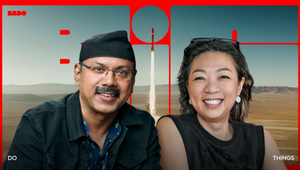
The New New Business: The Insights of the Unsaid, With Hans Lopez-Vito

Hans Lopez-Vito boasts an impressive 27-year track record in advertising and marketing, specialising in consumer research, brand positioning, creative strategy, and communications planning. His strategic prowess has propelled numerous brands to succeed in Asia's fast-paced marketplace.
Campaigns under his direction at BBDO have clinched over 50 regional strategy and effectiveness accolades.
Currently serving as the chief operating officer for BBDO Asia, Hans oversees pivotal regional client relationships, spearheads agency-wide strategy formulation, and directs comprehensive employee training initiatives.
Additionally, he chairs the agency's regional planning council, a collaborative group of brand and digital strategy leaders across Asia, entrusted with steering the agency's consumer insights programs and strategic planning tool development.
LBB> What was your first sale or new business win?
Hans> It was in June 2000. I was a young planner who joined McCann in Manila when the agency was invited to pitch for Universal Robina Corporation’s snacks business. Less than a week after that pitch brief was issued, I found myself in a focus group facility listening from behind one-way mirrors to teenagers about why they snacked the way they did.
I remember thinking – these are all very interesting, but none of what the respondents said would make the client’s brands stand out in the marketplace. This led me to my first and enduring lesson in campaign development: the best insights can be gleaned not from what consumers are saying but from what they are not saying.
I am grateful to say that we won the pitch.
LBB> What was the best piece of advice you got early on?
Hans> That “everything communicates.”
Everything – even the most minor details such as your choice of font, slide colour, body language, and thank you email… all convey something about the agency to the clients, which could spell the difference in the end.
LBB> How has the business of ‘selling’ in the creative industry changed since you started?
Hans> Back then, clients pitched less often and more thoroughly. When they had to pitch, they did so in a more holistic way – with brands, sub-brands, and products pitched at the same time. This promoted a relationship in which agencies were considered partners who understood a client’s business more holistically.
Today, most clients disaggregate their brands and pitch out everything separately. There is also a sense that pitches are more about pricing than they were then.
I am not complaining. As it is, agencies like ours have learned to cope very well. However, it is worth mentioning that client thinking often reflects the standards emulated by their pitch systems, which might not meet the desired level of excellence.
LBB> What are your thoughts about the pitching process that the industry largely runs on?
Hans> I observe that marketers rarely end up using the ideas presented to them by the winning pitch teams. Those winning ideas would either get revised before deployment or get replaced as new client data, which agencies did not have prior, gets considered. With this observation, pitches can be made more efficient for both the client and agency if the focus is on the team members’ backgrounds and team chemistry (and not the presentation).
LBB> How do you go about tailoring your selling approach according to the kind of person or business you’re approaching?
Hans> We put a lot of time into thinking about the casting of our teams – based on category knowledge, life stage, interest, and so on. For example, suppose we are pitching for a luxury brand. In that case, we need strategists who are passionate about luxury products and trends and choose art directors whose aesthetics work well for luxury products and not just for soft drinks.
LBB> New business and sales can often mean hearing ‘no’ a lot and quite a bit of rejection - how do you keep motivated?
Hans> We simply cannot take it all too seriously. In a pitch-driven world, you win some, and you lose some. If you accept this truth, pitching is easier to deal with. More importantly, I believe that losing a pitch is fine as long as your team has fun working together because pitches are real opportunities for team-building.
LBB> The advertising and marketing industry often blurs the line between personal and professional friendships and relationships… does this make selling easier or more difficult and delicate?
Hans> This is true for any industry. Personal relationships can and do colour new business dealings in any situation because businesses are made up of people who are looking for new services from other people. However, the latest news involving one of the industry’s largest holding companies is creating a lot of conjecture that the Chinese government is trying to clean up the industry and is demanding more transparency between many parties in the marketing services industry ecosystem. Purely speculation at this moment, but if true, this ought to be a welcome development for clients, their procurement teams, and agencies.
LBB> How important is cultural understanding when it comes to selling internationally?
Hans> Multi-country pitches are rarer compared to 10 years ago. Still, I sense they are slowly making a comeback as global marketers seek more efficiencies as well as consistency in the way their brands show up across multiple markets and media. Having said that, we have never won a multi-country pitch in which we did not get involvement from the local teams in key markets – not just on how to execute campaign ideas but also on more upstream topics such as defining the brand challenge in the local markets, audience selection/prioritisation, and consumer insight development.
LBB> There’s a lot of training for many parts of the industry, but what are your thoughts about the training and skills development when it comes to selling and new business?
Hans> We have had a very robust new business training program at BBDO China called “Pitch Perfect” (same title as the movie, but that’s just a coincidence). It’s now a 10-year-old training program that has helped BBDO achieve a successful conversion rate. While some of the training content has evolved over the years, the fundamental principles of the program remain the same.
LBB> What’s your advice for anyone who’s not necessarily come up as a salesperson who’s now expected to sell or win new business as part of their role?
Hans> Just do it. Byron Sharp once said that businesses are like leaky buckets – you lose customers all the time. It’s the same with the agency business. No agency can grow unless they’re winning new business. So, you just need to get on with it.















